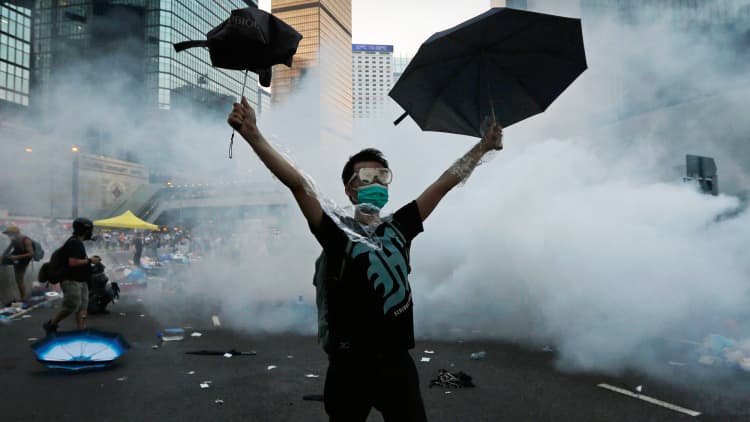While tens of thousands of Hong Kong residents take to the street, their signs call for democracy, autonomy and freedom—but experts say that some of those demonstrators are out there because of money.
The mainland Chinese media has taken to denouncing the protests that steadily grew throughout the weekend as potentially damaging to Hong Kong's economic fortunes, but Time's Michael Schuman writes that "activists in Hong Kong are fighting for an independence of administration and governance that will perpetuate their city's economic advantages."
The ostensibly pro-democracy protests are really about "the long term question of uncertainty" over where Hong Kong's economic future, said Jamian Ronca Spadavecchia, the founder of Oxbow Advisory.
"The same fundamentals that make Hong Kong attractive to invest in, are currently being challenged," Spadavecchia said. "And the more that these characteristics are marginalized, the less important Hong Kong plays within the greater Asia-Pacific—and within China itself."
There's no clear evidence that any major faction among the protesters—whether students or generally older moderates—are rallying around financial freedom slogans, but there are several distinct narratives underscoring just how important economics may be to this movement.
Read MoreHong Kong protests explained
"There is an elite sense that the more interference there is from China, the more dangerous it is for Hong Kong's long term [economic] role," said Derek Scissors, a resident scholar at the American Enterprise Institute, adding that the economic concerns of students are even more at play in the recent protests.
Many of these students, he explained, see a Beijing presence in Hong Kong as damaging to their own economic future: They are seeing higher housing costs as mainlanders move into the densely populated region, and they are seeing job creation slow despite China's rise.
And while some could argue that a free market has led to the economic inequality hurting these students, autonomy from the mainland may be the eventual cure. Schuman writes that "Hong Kong requires a popular administration that commands the support of the people in order to implement the reforms necessary to tackle these critical problems."

There have been reports that some of the region's elite are slowly demonstrating some support for the protests, but experts warn that this class is likely divided on the issue: Despite the argument that they have benefited from Hong Kong's autonomy, many have also seen important gains from maintaining close ties to Beijing.
Read MoreWill Hong Kong spark an Asian spring?
"A lot of tycoons or other elites who are heavily invested in China who tend to be very conservative ... don't want unrest, they don't want trouble. They just want business to go on," said Patrick Chovanec, chief strategist at Silvercrest Asset Management. "But I'm sure that there are others who feel that what makes Hong Kong special and unique is that it is an open society."
And while they weigh the benefits of close ties to China, the region's elite are also forced to consider the costs of unrest, he added.
"If Hong Kong is a place where you could never rock the boat, then it wouldn't be special and different. But if it's always rocking, then there is too much instability," Chovanec said.
There are also personal costs associated with supporting the protests, Scissors said, especially if the movement is increasingly characterized by violent incidents. "If you're an elite, you don't want to be on the side of violence—it puts a target on your back," Scissors said.


